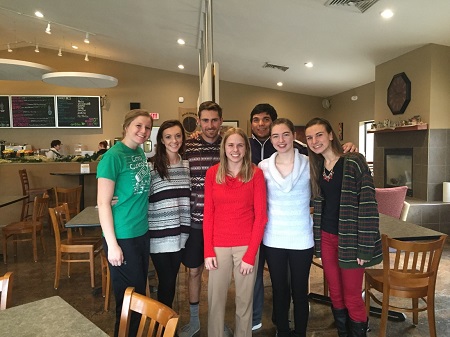Writing Lab, Missouri Baptist University
As described by Elizabeth Busekrus, Writing Lab Coordinator
How many tutors do you have, and what do you call yourselves? Are your tutors paid?
~7 writing coaches, paid
What makes your Writing Center unique?
~Our writing lab has a Writing Across the Curriculum (WAC) group to communicate with instructors across campus about how they teach and assess writing.
How do you train your writing coaches?
~English majors who work in the Writing Lab have to take a required Writing Tutorials class for their major. However, since we have been diversifying our staff (and have a variety of majors who work here now), they unfortunately do not receive the same opportunity. Therefore, at the beginning of the fall semester, I have a 2-day intensive training period, where we read some commonly associated tutoring articles (Stephen North, Andrea Lunsford, etc.), write about our experiences as a writer and a tutor, go through the Writing Lab manual (which lists any administrative responsibilities and common tutoring strategies), and do mock tutorials. It’s a fun way for us to bond as a team and to also learn about tutoring. The new tutors are there the entire time, and I have the more experienced tutors come in for a portion of it as well to relay experiences they have had and advice for the new tutors. During the semester, we have biweekly meetings, where we discuss struggles we have had during tutoring sessions and any areas of growth we see (for ourselves as tutors and for the Writing Lab as a whole). During these meetings, we also discuss any events we have coming up (Writing Week, workshops, writing contest), and next semester, we are going to have themes for each of our meetings (discussion of grammar in one meeting, literature reviews, APA formatting, etc.).

Give us 1 word to describe your community.
~Imagineers.
Describe a typical tutorial format.
~A typical tutorial format begins with asking the student what he/she would like us to focus on in the session. Depending on where they are in the process, we might brainstorm ideas together or read through a section of their writing assignment. We are always focusing on how to help them critically think deeper; we focus on purpose and audience in our tutoring sessions to help them see why they are writing that particular assignment. At the same time, we focus on what to improve to be a better communicator of their message; we work on areas they could improve to become better writers.
Anything else you would like other writing centers to know?
~The most important item to note with students is to make sure they know they have potential. Our writing lab is small, so we get to develop one-on-one relationships with [students]. Our job is not only to help them become better writers but to help them believe that they can.